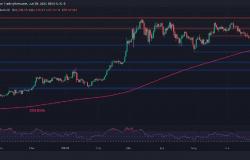German soldiers shooting at his boat, the sound of bullets on the hull of the boat, blood, tears.
Read also :
DIRECT. 80 years of the D-Day landings: Emmanuel Macron awards the Legion of Honor to 11 American veterans, speech by Joe Biden
Eighty years after setting foot on the sands of Normandy on June 6, 1944 at the age of 19, Richard Rung vividly remembers the day that changed the course of the Second World War and his life.
The 99-year-old former sailor has vivid and detailed memories of the Allied landings.
“The day of the landing is never very far away, you know […] sometimes it feels like it was yesterday,” he tells AFP from a suburb of Chicago, in the United States, where he lives with Dorothy, his wife of 75 years.
“These kinds of experiences catch up with you,” confides this mustachioed man, who wore his navy blue jacket bearing the US Navy emblem for the occasion.
Heavy fire
Richard Rung’s story with Normandy began in 1943, when he was called up for military service.
The young American chose the Navy on the advice of his father who assured him: “At least you will be at sea, and you will have something to eat.”
He dreams of serving on a destroyer but is assigned, because of his mechanical knowledge, to maintain the engine of a landing craft. This is what will lead him to France.
After training in the United States, the young man reached London, which was bombed by the Germans. “Every night there were raids,” he remembers.
On June 6, 1944, he landed on the Normandy beach of Omaha Beach. “We lowered the ramp at 7:30 a.m.… and they opened fire on us,” he still remembers.
With his crew, Richard Rung was part of the second assault wave organized on “D-Day”. That day, essentially 156,000 American, British and Canadian soldiers set foot on Normandy soil. More than 10,000 of them were killed or injured.
“Bend down !”
Despite the danger, Richard Rung tries to see what awaits them, a recklessness which earns him the pilot’s reprimands.
“He looked down and said to me: ‘Get down!'” he says, still remembering the sound of bullets hitting the side of the boat as he observed the beach.
“The machine guns were horrible,” he continues. “I will never forget them.”
The ship’s logbook, copied into its journal, provides a detailed account of the operation.
“07:30 arrived on the beach. Well guarded. Hit by two 88mm shells. One in the locker on the starboard side, one in the cockpit. One 47mm shell impact […] Two soldiers killed, two seriously injured. A 47mm shell on the ramp extension.
At 7:34 a.m., the boat reversed course and set off in search of a better site to disembark. It will take them several hours to find a suitable place. Only then can the injured be transported to a hospital ship.
Blood and salt
The deck of the boat “was overflowing with blood” mixed with the salt water that had entered when the ramp was first lowered, he said.
On the beach, he remembers the bodies of soldiers. “And guys crying.”
“It was terrible”.
The boat was carrying a bulldozer intended for mine clearance operations. But when the latter “arrived on the beach, he rolled over a mine, I learned that the next morning,” says Mr. Rung.
If the soldiers “were not hit by a bullet, they could easily step on a mine,” he points out.
Two days after the Landing, the young man made a macabre discovery: “a large pile of arms and legs”, he describes, confiding that he wondered how to identify these dead in such conditions.
Testimony
After more than two months in Normandy, Richard Rung was sent to the island of Leyte in the Philippines, the scene of clashes between Allied and Japanese troops. It was there that he learned of Japan’s surrender on September 2, 1945.
“No one can imagine the feeling that passed through us when we saw and knew that the war was over, and that what we had fought so long and so hard for had finally arrived,” he wrote in his diary.
After his demobilization in 1946, Mr. Rung went to study at university. He then became a professor of history and political science.
At first, he didn’t talk too much about what he experienced at the front, thinking that it was better that way. But “it was a mistake,” he confides. “A man who says ‘I don’t want to talk about it’ actually needs to talk about it.”
Even today, the nonagenarian continues to tell his story to young people. He urges them “to work for peace, and not for war.”





